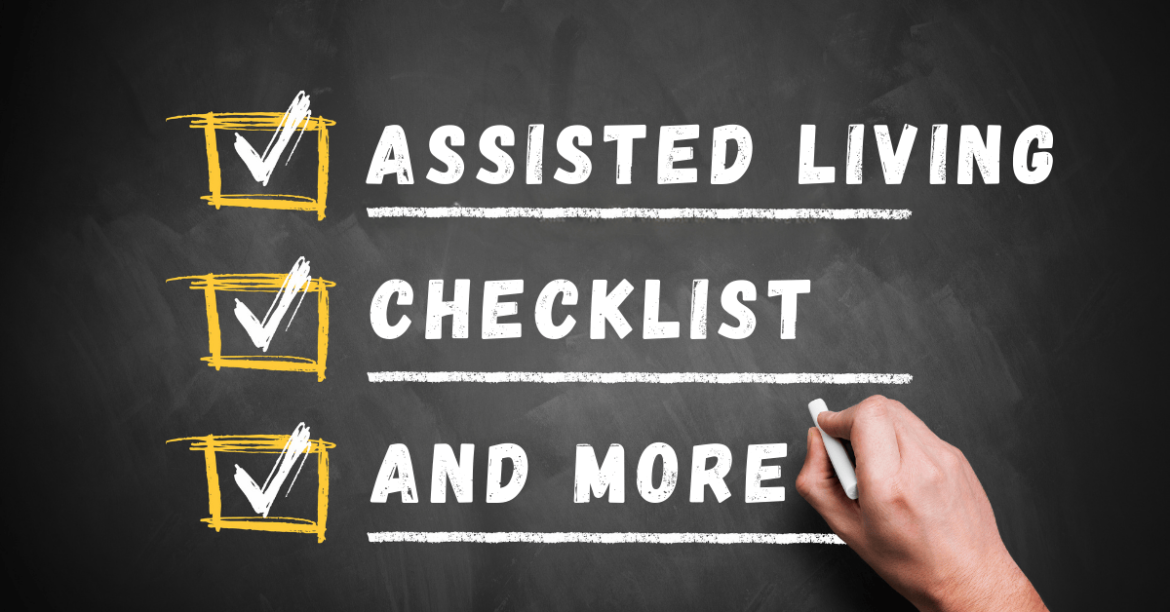Imagine joining the world’s best cruise. You’re getting the fancy tour you deserve, and from everything you’ve seen – it couldn’t be any better…right? You settle into your cabin, only to find no private bathroom. You bring it up with management – and they say you should’ve asked for it before signing up.
You needed to have asked more questions as you encountered hidden costs and a lack of certain services. Imagine that happening after your search for the best-assisted living program. What if you had a checklist? It can be your compass for choosing the Assisted Living Facility (ALF) that you deserve!
What should you look for?
The bare minimum that any senior living facility, like assisted living, nursing homes or memory care, can ideally offer are:
- 24/7 supervision and security
- Help with Activities of Daily Living (ADLs)
- Housekeeping and laundry
- Meals and snacks
- Healthcare planning and management
- Proper visitation rights
- Regular contact with friends and family (if the patient is comfortable).
- A golden ratio of staff to patients
- Good atmosphere, and overall well-maintenance and good hygiene of the place
- Qualified staff and administrators
- Careful medication management for residents.
- Fun activities, community events, and exercise programs
- Transportation
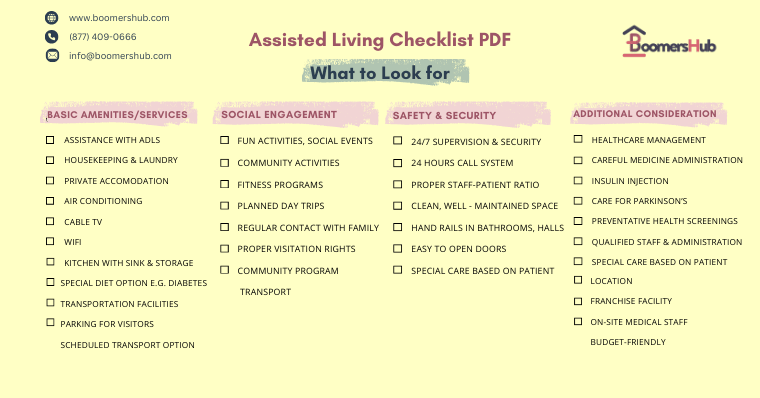
The best part is that we’ve made it into a PDF and image so you can download and print it.
Why do you need a checklist for moving into assisted living?
The rest of your life depends on choosing a suitable facility. If you don’t know what to look for, you’ll cheat yourself out of getting the most budget-friendly, welcoming, and medically equipped community!
To make sure you’re well prepared, we’ve grouped questions into five categories to use in your checklist for assisted living facilities:
Category 1: Community Layout
- Should I Rent or Buy a Senior Apartment?
- What Types of Apartments Are Open Right Now?
- Is the Facility in a Good Location?
- What Common Spaces Are Available?
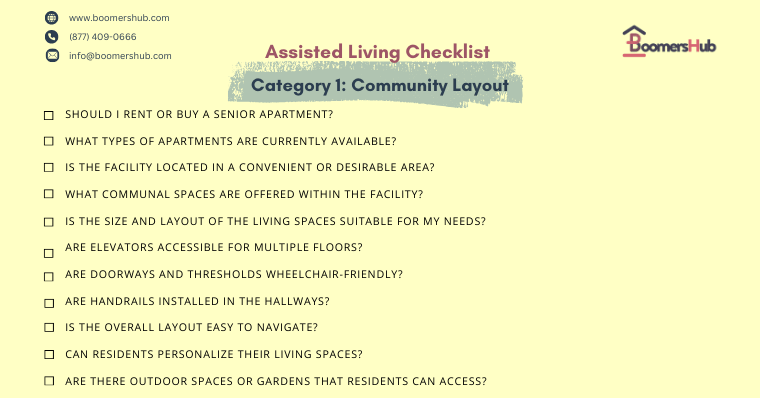
These are some basic questions you can ask to understand your accommodation. A clear visual is essential to ease your mind and loved ones. Everything is listed in more detail below.
Category 2: Costs and Contracts
- How Much Does Assisted Living Cost for a Couple?
- What’s the Philosophy of Senior Care?
- What Unique Rules Exist?
- Is There a Waitlist?
- Can Seniors Visit Assisted Living Facility Before Moving in Permanently?
- Do You Create a Written Plan For the Elderly’s Needs?
- What Can I Do if I Have a Complaint?
- Does the Community Allow You to Speak to References?
- Who Draws up the Resident Service Plan?
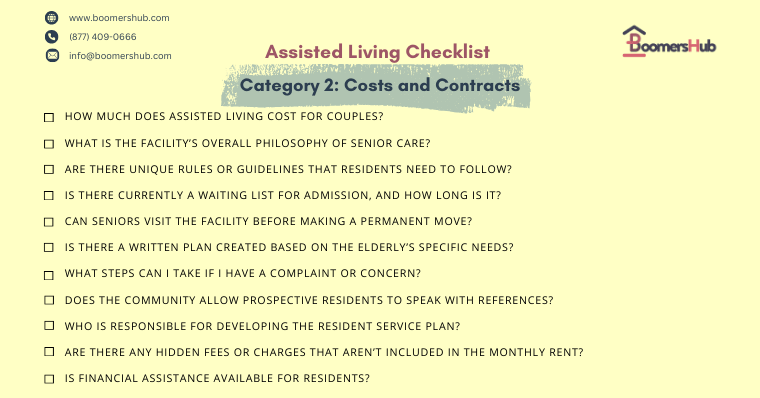
Going through this list of questions will help you prepare for the rules and regulations set up by the facility you want to move into. Some rules may seem logical, and other philosophies must align with your core beliefs. It is best to ask the hard questions now rather than later to avoid fallout and discomfort.
Category 3: Services and needs
- What Does My Monthly Service Fee Cover?
- Does the Assisted Living Facility Offer Activities and Events?
- Does the Assisted Living Facility Offer Transportation?
- Will the New Resident Get Along With Neighbors?
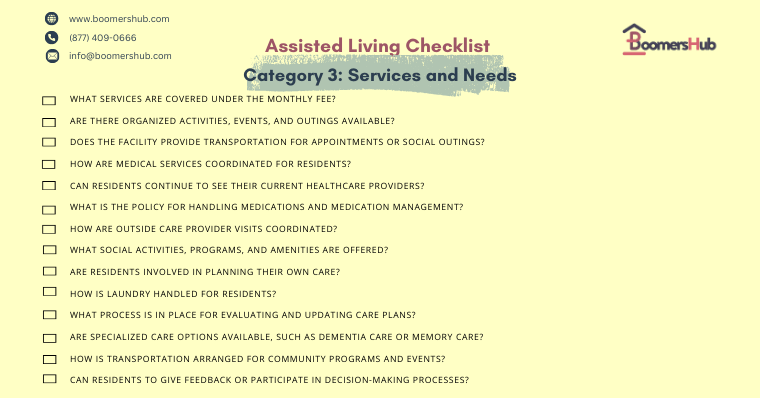
Not all communities offer the same amenities and services to residents. So, to get your money’s worth and satisfy your expectations, these questions can come in handy.
Category 4: Food and Meal Options
1. Are There Various Meal Options Available?
Ask to see the menu to find out if you’d like the meals they offer. Can you choose between dining with other residents or have your meals in your apartment?
Consider your dietary needs like:
- Do they serve vegetarian, gluten-free, low-sodium diet, or paleo options?
- How do they handle meals for elders with food allergies?
- Does the community provide Halal or Kosher variations?
- Are there snacks served in-between meals?
- Are meals served in your apartment?
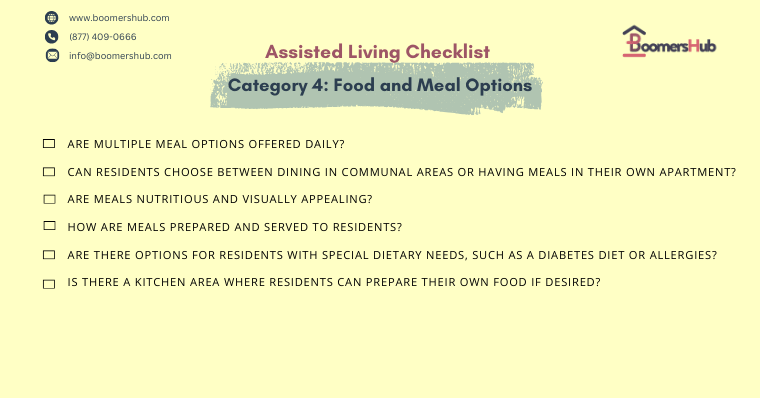
Category 5: Staff and Medical Practitioners
- How Well-Trained Are the Staff?
- What’s the Staff-to-Resident Ratio and Staff Turnover Rate?
- Are There On-Site Health Facilities at the Assisted Living?
- Do You Offer End-of-Life or Hospice Care?
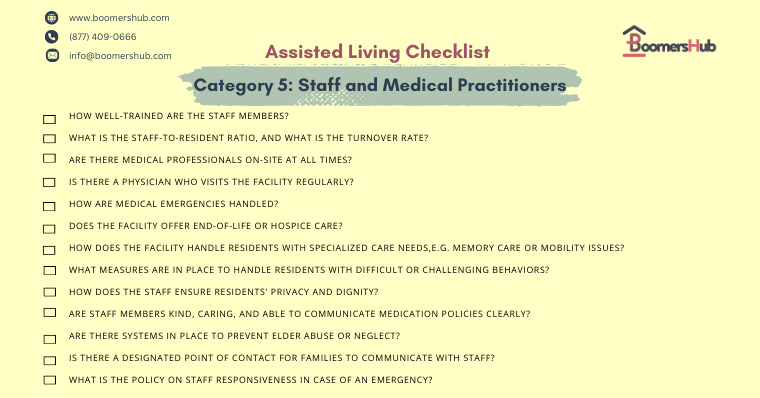
This is extremely important. At the end of the day your health is probably one of the reasons for checking into an assisted living facility. These questions can help you determine if you will receive the best care based on your medical needs.
Category 6: Assisted Living Safety
- What Do You Do to Keep the Elderly Safe?
- Will the Assisted Living Facility Continue to Care for the Seniors as Their Needs Change?
- What Happens if There’s an Emergency?
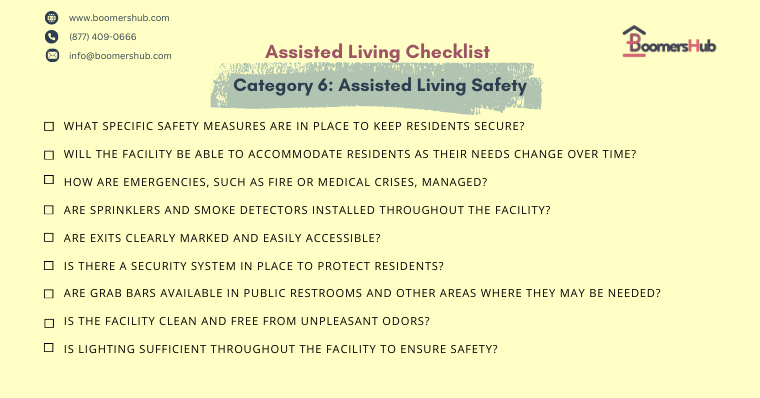
Here’s a shock factor – if you do the right research, you’ll find that there is actually a lot of neglect and a lack of security for seniors in these places. But don’t let that discourage you. Asking what we’ve listed can help you address this and determine if the facility that you’re considering is a right fit or not. If you issues in selection, we are just one call away!
For more awareness, read:
Assisted living checklist pdf for packing
This packing checklist for moving into assisted living covers the essential items you would want to keep with you:
Clothing
- 5-7 shirts/blouses
- 5-7 pairs of pants/skirts
- 7-10 pairs of socks
- 7-10 pairs of underwear
- 2-3 sets of pajamas
- 1-2 sweaters/light jackets
- 1 coat/heavier jacket
- Comfortable walking shoes, slippers
Toiletries
- Toothbrush and toothpaste
- Comb/brush
- Deodorant
- Shampoo and conditioner
- Soap
- Shaving supplies
- Makeup (if used)
- Medications (in original containers)
- Medical equipment (cane, walker, wheelchair, etc.)
Bedding
- Mattress pad or mattress topper (if desired)
- Sheets and pillowcases
- Blankets and/or comforter
- Pillow(s)
Important Documents
- Insurance cards
- Medication list
- Advanced directives
- Contact information
Other Items
-
- Eyeglasses, contacts, and solution
- Hearing aids and batteries
- Photos, framed art, or other decorations
- Books, magazines, puzzles
- Small radio or tablet for entertainment
- Phone and charger
- Stationery, envelopes, stamps
- Cash or checkbook
- Calendar or planner
Apart from this, you may review our assisted living packing checklist PDF resources to find one that works best for your specific assisted living move.
What not to bring to assisted living communities?
Assisted living communities encourage your comfort and facilitate a supportive environment. However, due to space limitation, safety of other residents and other regulations, some items are generally not recommended as follows:
- Large Furniture and Appliances: Assisted living rooms have limited space, so bulky items like big couches or full-size fridges may not fit.
- Weapons and Dangerous Items: For safety reasons, firearms, knives, lighters, and other hazardous items should be left at home.
- Valuables and Irreplaceable Items: Expensive belongings and important documents are better kept secure elsewhere to prevent loss or damage.
- Pets (unless allowed): Many facilities restrict pets due to allergies, cleanliness, and care concerns. Check facility policies first.
- Excess Clothing/Linens: Storage space is limited, so only pack essential clothing and a few sets of bedding.
- Bulky Medical Equipment: Coordinate with staff on appropriate assistive devices, as the facility may provide larger equipment.
Key points for a smooth transition into assisted living
- Touring an assisted living community before moving in helps you get a feel of the environment. You can do a few frequent visits to warm up to moving in.
- Before making a decision, consider the community layout, costs and contracts, services and needs, and food and meal options.
- Refer to this 5-category assisted living interview checklist so you can ask the right questions.
Download Our senior living packing checklist pdf
Click below to download our full pdf
Final Thoughts
When considering assisted living, it is important to ask the right questions. Asking the questions helps you and the facility figure out if you both are a right fit. Not only that, but these queries for assisted living interviews also help in decision-making, and you’ll definitely sleep better after making a choice. Also, take the time to tour communities before deciding.
Bookmark our assisted living checklist pdf so that you can discover important information.
Read our previous article on choosing the right assisted living facility.
Frequently Asked Questions
What is the best way to research assisted living options?
Our business specializes in suggesting to you the best assisted living options based on your criteria. Visit our website to get in touch and start your research!
Apart from that, you can:
- List the needs of the senior in question.
- Explore your community and see reviews on services and staff.
- Ask institutions working with boomers for more clarity.
- Do a firsthand visit to the facilities.
- Consult with local advisors or online resources to compare prices, offerings, etc.
What is it like to move into an assisted living community?
It can evoke bittersweet feelings ranging from hope for new beginnings and friendship to concern over adjusting to unfamiliar settings. With time and the help of friendly staff and community activities, older adults become comfortable with new independence, safety, and a better lifestyle.
How long does it take for a senior to adjust to assisted living?
Usually, seniors take a few weeks to three months to adjust to their new life, depending on factors like health and mindset. Forming social connections and routines and participating in community events helps seniors become more comfortable and adjust to their new life.
Interested to learn more about Assisted Living? You may also like:

